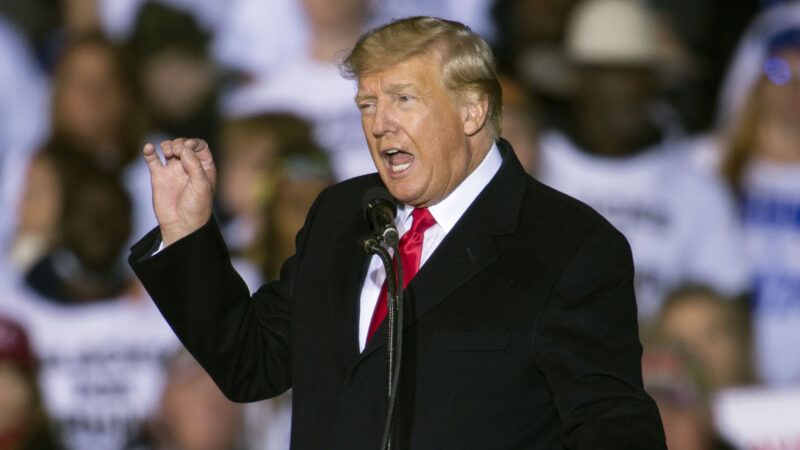Donald Trump Just Showed Why Reforming the Electoral Count Act Is Essential
By saying the quiet part loud, the former president should spur Congress into action.

Former President Donald Trump issued a statement on Sunday confirming that his efforts to overturn the legitimate results of the 2020 presidential election were…an attempt to overturn the legitimate results of the 2020 presidential election.
In response to ongoing attempts to change key provisions of the Electoral Count Act, the law that governs the process by which Congress certifies the results of the Electoral College, Trump claimed that the reform effort itself is an indication of how close Republicans might have been to flipping the outcome in January 2021.
"If the Vice President (Mike Pence) had 'absolutely no right' to change the Presidential Election results in the Senate, despite fraud and many other irregularities, how come the Democrats and RINO Republicans, like Wacky Susan Collins, are desperately trying to pass legislation that will not allow the Vice President to change the results of the election?" Trump wrote. "Actually, what they are saying, is that Mike Pence did have the right to change the outcome, and they now want to take that right away. Unfortunately, he didn't exercise that power, he could have overturned the Election!"
Truly, this is one of the all-time greatest "saying the quiet part loud" moments. But there is a nugget of a valuable point in there.
Under the Electoral Count Act, the president of the Senate (which is the vice president, per the Constitution) is responsible for opening the envelopes containing the Electoral College's state-by-state vote tallies. The vice president's role in the process has always been assumed to be ceremonial, but the law does not explicitly say that. As Reason's Joe Lancaster explained last week, Trump and his acolytes "seized upon this vagueness when they tried to pressure then–Vice President Mike Pence to either decline to certify the results, or else simply pick a different slate of electors in enough swing states to tip the election to Trump."
The so-called "Eastman memo," drafted by John Eastman, an attorney on Trump's legal team, clearly lays out the steps for exploiting the key weakness in the Electoral Count Act. If the same party held the vice presidency and a majority of the state-by-state congressional delegations in the House—as Republicans did on January 6, 2020—then the Eastman memo is an effective road map for doing exactly what Trump now admits he was trying to do: get a sitting vice president to overturn the legitimate results of an election.
Fortunately, Pence didn't exercise that power. But it would be foolish to believe that partisan hacks—on either side—would not at least try to put this option on the table if the same circumstances are repeated in a future presidential election. That's why a fix to the Electoral Count Act is essential.
A bipartisan group of senators is trying to do exactly that, with at least six Democrats reportedly working with a group of Republicans led by Sens. Susan Collins (R–Maine) and Mitt Romney (R–Utah) to make changes to clarify the vote-counting procedures.
The most important change is exactly what Trump's statement zeroed in on: clarifying that the vice president does not have the power to overturn an election. But other aspects of the law could be tightened as well, with an eye towards preventing the sorts of shenanigans that Republicans tried to pull in 2020—like prohibiting state legislatures from certifying competing slates of electors in defiance of the certified results. The Electoral Count Act was originally created to fix problems that arose during the controversial presidential election of 1876, so amending it to address new problems is very much in the spirit of the law's original intent.
"Fixing the Electoral Count Act is urgently needed to avoid future constitutional crises," writes Andy Craig of the Cato Institute. "It's likely that any version of reform proposed in Congress would be an improvement over the notoriously confusing status quo. A redrawn ECA should be grounded in the constitutional separation of powers, allowing Congress to act when it potentially needs to but otherwise closing the door to partisan malfeasance."
By pointing out how close he came to exploiting the law's weakness, Trump has only succeeded in making a powerful case for reform.
That's not the case that Trump was trying to make, of course. From the former president's perspective, he was arguing against reform—and blaming Pence for refusing to go along with the plot to "change the Presidential Election results in the Senate." Coming just days after Trump dangled the prospect of pardons for the rioters who stormed the U.S. Capitol on January 6, 2021, it's not a stretch to suspect that Trump wants to make his personal grievances over the 2020 election a centerpiece of his potential 2024 presidential bid—a bid that might bring him into competition with Pence, who is rumored to be considering running as well.
That's going to be an ugly mess, but there's little to be done about it.
What can be fixed is the vagueness in the Electoral Count Act. Congress ought not to wait around to see if the next vice president in Pence's shoes will have an equal measure of courage.


Show Comments (203)